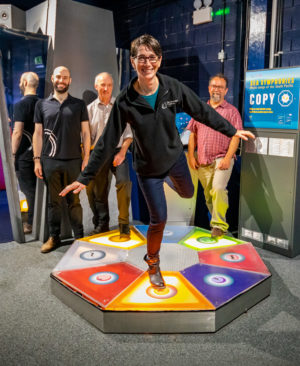Sea Symphonies: Whale songs of the South Pacific
 World-leading whale researchers from the University of St Andrews take part in a new exhibition at Dundee Science Centre, where visitors can recreate and record their own whale songs.
World-leading whale researchers from the University of St Andrews take part in a new exhibition at Dundee Science Centre, where visitors can recreate and record their own whale songs.
Sea Symphonies: Whale songs of the South Pacific launches at the Dundee Science Centre on Saturday 28 September. Leading whale researcher’s Dr Ellen Garland and Dr Luke Rendell, from the Sea Mammal Research Unit (SMRU) at the University of St Andrews, have developed a unique, interactive exhibition which will give members of the public the opportunity to understand and recreate one of the most captivating displays in the animal kingdom, the song of the humpback whale.
Visitors to the exhibition will have the opportunity to produce live recreations of actual humpback songs by following a score and then introduce their own variations on a large-scale floor piano. The interactive exhibit will also allow visitors to use a light-beam interrupt synthesiser to create their own masterpieces from elements of real humpback songs.
Although people have been entranced by whale songs since recordings were first released to the public by Dr Roger Payne in 1970, research led by Dr Garland and Dr Rendell over the past decade has led to new insights about how whales learn these songs and how songs change over time as they are passed from population to population across thousands of kilometres of the South Pacific Ocean.
The exhibition seeks to update the relationship between Dundee and whales, a city once heavily dependent on whale oil for its jute industry. One of the most famous stories involving the city and humpback whales is that of the ‘Tay Whale’, when in 1883 a humpback whale swam up the Firth of Tay and was harpooned by local whalers ashore during their winter break. Nowadays, attitudes are changing thanks to research like that presented in the exhibit. There is an appreciation of the sophistication and complexity of whale behaviour with a focus on whale conservation, and it is likely that if a humpback were to swim up the Tay today, it would receive a very different welcome!
Organisers of the exhibit have also worked with Biome Collective, a collaborative group of game developers in Dundee, to develop a fun video game based on whale songs, where visitors can try and keep up with a singing whale and also introduce their own versions of the songs.
The research team will also hold a series of workshops throughout the exhibition period with local primary schools to support learning and creative expression inspired by humpback songs.
Visitors will see how scientists use natural markings to identify individual whales when they are singing, learn about the lives of some of the individual whales known to researchers, and play a game to identify whales themselves.
Other activities available include completing a layered jigsaw puzzle to follow the evolutionary journey from land-based ancestors to modern whales.
Visitors can ask the whale scientists any questions that they have by writing a ‘postcard to a scientist’ and can follow the @DundeeSciWhales twitter account to see their questions answered. This will give the researchers an opportunity to understand what people know and think about whales.
The exhibition is a collaboration between the University of St Andrews and the Dundee Science Centre, with additional funding support from the Royal Society. Entrance is included in standard admission prices.
Sea Symphonies: Whale songs of the South Pacific was launched at the Dundee Science Centre as part of Explorathon 2019. To find out more visit the Explorathon 2019 website.
Issued by the University of St Andrews Communications Office.